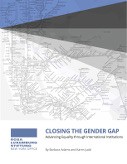
By Barbara Adams and Karen Judd
Almost 22 years have passed since the Fourth World Conference on Women was held in Beijing, marking a turning point for women’s rights activists around the world. For many, the approved Declaration and Platform for Action represented a moment of vindication for the rights, living experiences, and human dignity of women everywhere. But the promises made in Beijing regarding the indivisibility of human rights, gender equality, and the empowerment of women and girls were not fulfilled, and it is in the socioeconomic field where this deficit strikes one of its hardest blows.
The economic system of neoliberalism does not take into consideration the disadvantages faced every day by women, especially by those from the most vulnerable sections of society: women of color, working women, women in poverty, migrants, and elders. In fact, it rather deepens existing inequalities and power disparities. Austerity measures taken against vital services—such as childcare, transportation, health, education, and other social services—affect women in particular, exacerbating the differences imposed by a gendered division of labor and relegating women’s role in the formal economy.
This year’s Commission on the Status of Women (CSW 61) is set to address the issue of women’s economic empowerment in the changing world of work. Obscene accumulation of riches by sheer dispossession, the pervasive domination of white patriarchy in the society, and the artificially imposed separation between macroeconomic and social policies are some of the factors that keep our communities away from achieving substantive equality among genders. Formal adoption of legal frameworks are not enough to battle these disparities, and the actions directed to the expansion of opportunities instead of guaranteeing rights fall short of the goal of enabling women’s advancement.
Empowerment in the economic sphere, therefore, has a meaning that goes beyond simply promoting women’s participation in economic activity. It must be built on the basis of a transformative and inclusive macroeconomic approach, within a framework founded on the respect of human rights and the mechanisms for their implementation. International institutions, with their relevant bodies and instruments, make up a crucial space to realize these goals. Only by adopting and carrying out a progressive gender agenda, backed by all the interested parties, will such an outcome be accomplished.
In the new RLS–NYC study “Closing the Gender Gap: Advancing Equality through International Institutions,” UN experts Barbara Adams and Karen Judd offer an informed and detailed analysis of the present and future of women’s economic empowerment in the context of multilateral organizations. Building a critical case against gender-blind and growth-ridden approaches to national and international economic policy-making, the authors present the readers with an essential set of tools for understanding the ideas and interests that undergird the different views of the concept of economic empowerment. They then assess strategies and their contributions to the realization of rights, and help us to envision a sustainable, accountable, and fair global system for women and girls everywhere.
